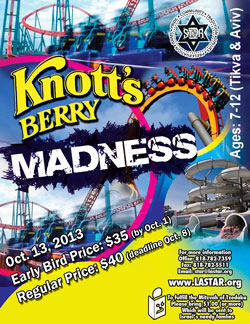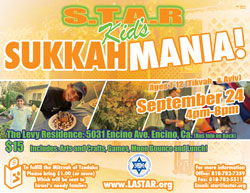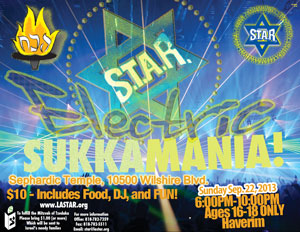
Knott’s Haunt
Oct. 26, 2013
Ages 13-18 (Mitzvah & Haverim)
October 25, 2013 Chaye Sarah
S.T.A.R. News & Events
Here are S.T.A.R.’s upcoming exciting events:
OCT. 26, 2013
Knott’s Scary Haunt, a night of fright and flight! SOLD OUT
Nov. 10, 2013
Join STAR for the Funniest animated movie of the year! Free Birds.
This Shabbat
Friday Candle Lighting: 5:49pm
Shabbat Ends: 6:49pm
Torah Message
The Dust of Greatness
"Come, blessed of G-d" (24:31)
About three hundred years ago, in the 1960’s there was a TV hairspray commercial whose slogan was, "The closer you get, the better she looks!" Judging by the model’s hairdo, this particular hairspray made motorcycle crash-helmets redundant. (Could be they were pitching their sales at Hell’s Angels?)
It always struck me that the closer you got to the rich and the beautiful, the less and less better they looked.
Unlike the denizens of Hollywood, to whom proximity usually reveals nothing but larger and larger flaws, the privilege of spending time with a true Torah Sage demonstrates the closer you get – the better they look.
Recently we experienced the passing of one of the greatest Rabbis of our age, Rabbi Ovadia Yosef,zatzal. Listening to the eulogies of this extraordinary man reminded me of the time I met Rabbi Shlomo Zalman Auerbach, zatzal. The meeting cannot have lasted more than five minutes. My grasp of Hebrew at the time was negligible. However, when I left the room I felt like a different person. It was nothing he had said. He had barely looked at me. It came from merely being in his presence. I left his room with the dust of greatness on me.
The four species of Succot – the palm frond, the etrog, the willow and the myrtle – represent four kinds of Jewish people. The etrog has a beautiful aroma and it tastes good. The etrog symbolizes a Jew who has both Torah and mitzvot. The palm tree yields dates, which taste good, but the tree has no aroma. This symbolizes the Jew who has Torah but no mitzvot. The myrtle has a beautiful aroma, but it has no taste. This is the Jew who has mitzvot but no Torah. And finally, the willow, which has neither taste nor aroma. This is the Jew who has neither Torah nor mitzvot. Without this willow, however, one cannot perform the mitzvah of the four species – and without the "willow-Jew" the Jewish People is not the Jewish People. It is not Klal Yisrael.
The willow is essential to the wholeness of the Jewish People. By itself, however, it has little or nothing to recommend it. Why then is the lowly willow accorded a special day of its own during Succot on Hoshana Rabba? Why does the willow, the least auspicious of the four species, have its own day? There is no ‘Etrog Day’ or ‘Lulav Day’ during Succot. What is so special about the willow that it merits its own special day?
Everything in this world recognizes itself by its opposite. A pigmy can never understand what small is until he meets a Watussi giant. And someone on a low spiritual level can only recognize where he is when he meets someone great.
When Lavan saw Eliezer he mistook him for Avraham Avinu. Eliezer was no Avraham Avinu, but to Lavan he was a spiritual giant. Through his encounter with Eliezer, Lavan recognized his own lowliness, and in doing so he was elevated to a point where his words had the power to change reality. For when Lavan said, "Come, blessed of G-d," Eliezer emerged from the curse of being a descendent of Canaan, and became in truth a baruch, "blessed."
The same is true of the willow. By being bound together with the other species and recognizing its lowliness, it is elevated to the point that it has a power of its own, distinct from its role of completing the four species. The discovery of true self that comes through self-effacement and humility makes the willow worthy to have its own day in the festival.
Few things can be more depressing than realizing exactly how low we are spiritually, how far we are from where G-d wants us to be, how far we are from where we ourselves want to be.
And, yet, that "willow moment" can unlock the key to true spiritual power.
- Sources: based on the Kotzker Rebbe quoted by the Shem MiShmuel in his essays on Hoshana Rabba
Rabbi M. Weiss Rabbi Y. Sakhai
Community News
Em Habanim Congregation
Weekly Parashat Hashavua class with Rabbi Joshua Bittan on Wednesdays at 8:30pm for more info. visit www.emhabanim.com
Avot Ubanim Program has started for fathers and their kids of ages 4 and up every Saturday night from 7:30pm – 8:30pm, Lots of prizes and great Pizza every week!
****
Em Habanim Sephardic Congregation is pleased to make available its elegant venue for your celebration. Excellent location with easy access to freeways. For more info. visit emhabanim.com
October 18, 2013 Vayera
S.T.A.R. News & Events
Here are S.T.A.R.’s upcoming exciting events:
OCT. 26, 2013
Knott’s Scary Haunt, a night of fright and flight!
Nov. 10, 2013
Join STAR for the Funniest animated movie of the year! Free Birds.

Knott’s Berry Madness
Oct. 13, 2013
Ages 7-12 (Tikvah & Aviv)
October 3, 2013 Noach
S.T.A.R. News & Events
Here are S.T.A.R.’s upcoming exciting events:
OCT. 13, 2013
Kid’s Knott’s Berry Madness is going to be fantastic!
OCT. 26, 2013
Knott’s Scary Haunt, a night of fright and flight!
This Shabbat
Friday Candle Lighting: 6:15pm
Shabbat Ends: 7:15pm
Torah Message
We Have The Technology
"They said to one another, ‘Come, let us make bricks and burn them in fire.’ And the brick served them as stone, and the lime served them as mortar." (11:3)
Technology is the conceit of the modern world.
The GPS system in our car allows us to receive satellite signals locating our position to within six feet anywhere on the planet. Behind the helm of our trusty gleaming V-8, we are the kings of the road. Previous generations pale into technological primitives.
We have the technology.
With a cellular phone we can call from the desert, from the top of a mountain, from the middle of nowhere, and communicate to anywhere in the world. And what are those deathless words that we wish to communicate across the tens of thousands of miles?
"Hi! Guess where I am!"
Now that’s what I call progress.
We may know where our car is better than ever before, but when it comes to knowing where weourselves are, that’s a different story.
If we had developed in any real sense over the last couple of thousand years, would we still find anything of value in Shakespeare? If the human spirit had undergone a comparable degree of progress to technology, the poetry and art of those who died hundreds of years ago should seem impossibly quaint to the modern eye. If we were really more advanced, no one should be in the slightest bit interested in John Donne, Cervantes, Sophocles, Pascal, Mozart or Boticelli – except for historians. And yet, we recognize that our generation is hard put to come anywhere close to these artists.
Technology is an apology for our feelings of inferiority when we compare ourselves to our forebears. Our axiom is, "We may have less to say, but we can say it from the middle of nowhere." Cold comfort is better than none.
At the end of this week’s Torah portion there is a description of the attempt of the Generation of Dispersion (Dor Hapalaga) to build a tower that reached into the sky.
“They said to one another, ‘Come, let us make bricks and burn them in fire.’ And the brick served them as stone, and the lime served them as mortar.”
Rashi comments: “In Babylon there were no stones…”
Because there were no stones in Babylon, they were forced to apply technology and invent the brick. Immediately following this verse they say, "Come, let’s build a city and a tower with its top in the heavens." They wanted to make a tower to challenge G-d.
This is a seeming non-sequitur. What does the lack of stones in Babylon have to do with building a city and a tower to challenge G-d? Why is making bricks a harbinger of incipient rebellion?
The Dor Hapalaga was intoxicated with technology. Bricks were the Babylonian equivalent of a Saturn V rocket. Take some mud, bake it and voila! Genius. If Man can take mud and turn it into towers and spires and palaces, what can he not do? Is there a limit to his powers?
From this kind of thinking there is a very small step for Mankind to think that they can dispense with G-d completely.
"Let us build and make for us a name.”
We have the technology.
- Sources: Rabbi Yosef Chaim Sonnenfeld, Rabbi Yissochar Frand
Rabbi M. Weiss Rabbi Y. Sakhai
Community News
Em Habanim Congregation
Weekly Parashat Hashavua class with Rabbi Joshua Bittan on Wednesdays at 8:30pm for more info. visit www.emhabanim.com
Avot Ubanim Program has started for fathers and their kids of ages 4 and up every Saturday night from 7:30pm – 8:30pm, Lots of prizes and great Pizza every week!
****
Em Habanim Sephardic Congregation is pleased to make available its elegant venue for your celebration. Excellent location with easy access to freeways. For more info. visit emhabanim.com

Kids Sukkatastic
September 24, 2013
Ages 7-12 (Tikvah & Aviv)

Teen Electric SukkaMania
Sep. 22, 2013
Ages 16-18 (Haverim)

Jet Skiing
Sep. 15, 2013
Ages 13-18 ( Mitzvah & Haverim)

New Years In Newport
Aug. 25, 2013
Ages 7-12 (Tikvah & Aviv)

Camping by the Beach
July 23-25
Kds Ages 11-14



